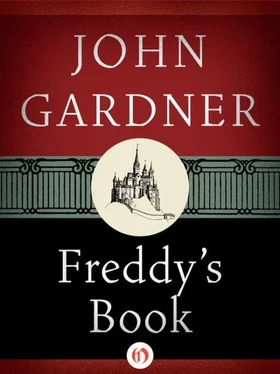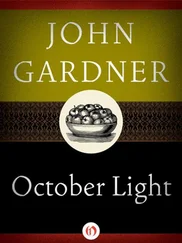Forgetting himself, Bishop Brask heaved a sudden sigh. Bishop Sunnanväder glanced at him with a look of concern. Brask knew well enough that the concern was, like everything else, policy. He waved his hand vaguely and smiled. “It’s nothing,” he said. “Just thinking of the snow.” Bishop Sunnanväder glanced at the window, a great blank of white, and his expression changed to cunning. He was a fat man, professionally meek and jovial, a man who always cried at church music — cried genuinely, perhaps, as Brask cried genuinely over poetry — but he was not as good an actor as he no doubt imagined; the look of cunning was always waiting at the edges of his face, prepared to leap out and seize his features.
Norby, for his part, had no time for these delicate dramas. He said, “King Gustav counts heavily on the friendship of Lübeck, but he’s in trouble there. Fredrik of Denmark is no fool, believe me! It was Kristian’s policy to shift trade to the Dutch, but now Kristian himself is in the Netherlands — he and his supporters. Why should Fredrik serve the friends of his enemy? Everything has changed before his eyes, but poor Gustav doesn’t see it!” Norby laughed. “I rob the ships of Lübeck, but I never kill a soul. They expect me — they know when I’m coming. We have an arrangement. I take their goods, I very carefully store them, I prevent them from reaching their Swedish destinations, but when the wind changes—”
“That’s good! That’s very good!” said Mickilsson, eyes widening. Clearly it came as a complete surprise to him. Troublesome, troublesome, thought Bishop Brask. It was all very well to work with innocents like Norby, but to conspire with fools was a dangerous business. However, he let his face show nothing.
Long after all that needed saying had been said, the meeting of the conspirators dragged on. It was the weather, perhaps, the snowy day outside as bleak as their prospects if the plot should fail; here inside, the immense warm fire, comforting as victory. And so they talked and talked, repeating themselves. Gradually Bishop Brask stopped listening entirely, brooding on dangers more remote.
Gustav Vasa would of course destroy the Church; it was a foregone conclusion. He had never claimed he would do otherwise. Already he was hinting that the portion of tithe which was allotted to the running of parish churches should be diverted to the pay of his soldiers. To Bishop Brask himself he had written, “Necessity overrides the law, and not the law of man only, but sometimes the law of God.” And already his minister Lars Andreae had proclaimed, on Gustav’s instigation, the Lutheran doctrine that the Church, properly considered, was made up of the whole community of the faithful, so that the wealth of the Church was in fact the wealth of the people. Already he had turned the printing press at Uppsala to the production of a Bible in Swedish, and, adding insult to injury, had ordered Bishop Brask himself to help with the translation — an order Brask had had no choice but to obey. But what would they gain, overthrowing Gustav Vasa? Now King Fredrik too, it seemed, was warming to the merchantmen of Germany, Luther’s right arm. Bishop Brask began to see more clearly, staring down thoughtfully at his amber-red wine, the strategy of the Devil — and its futility. Keep everything in confusion, that was the Devil’s way of doing things. Baffle and madden the enemy and hope for the best. And if the Devil was as powerless to control things as he seemed, what could the best be, Brask thought, theological, but the will of God? The bishop kept himself from frowning, not wishing to draw attention. Did he believe, he wondered in “the will of God”? Like a reflex, a soul-crushing, weariness came over him. What did it matter what he thought, after all? Life would go on, or would go on until it stopped. If the will of God was inescapable, like the fall of the stones in an avalanche, then it was clearly no business of his. Let the chips, the boulders, the castles fall where they may. He closed his eyes.
He dreamed he was standing before the Pope, who was for some reason enormous, clothed in the brightest red velvet. The Holy Father was raising a silver chalice, holding it carefully between his thumb and first finger, his smallest finger affectedly extended, his face not a man’s but a woman’s, elaborately painted. When he’d sipped, he began to set the chalice down, holding it out over Bishop Brask’s head and lowering it slowly, as if he did not know that Brask was standing there, about to be crushed. “Father!” Bishop Brask squealed, his voice no louder than the hum of a mosquito. Now a great shadow had fallen in a circle around him from the base of the chalice. Just before darkness engulfed him, he saw, high above the Pope’s head, a great circle of blinding light descending like a ring of blue-white fire. The circle seemed as large as the whole world, and it was speedily growing larger, like a planet on collision course with Earth. Bishop Brask jerked suddenly awake, spilling a little flutter of wine. Otherwise, he showed no sign that he’d fallen asleep. Something had crashed, the same instant he awakened. It was a glass Sören Norby had thrown, in high spirits, into the fireplace.
7.
BY THE SPRING OF 1525 the conspiracy was all but crushed. No one in Stockholm was much surprised least of all Bishop Brask, who had read the signs well enough and soon enough to keep himself clear of suspicion. Von Melen, called home from the fiasco at Visby, prudently avoided Stockholm and went to earth in his castle of Kalmar.
Gustav Vasa shook his head in disgust, pacing, as he seemed always to do these days, venting his anger on the huge, patient figure of Lars-Goren and across the room, Hans Brask. “The fool!” he said, shaking his fist before Lars-Goren’s face. “Does he think I don’t know what he’s been up to?” He whirled away, pointing fiercely at Bishop Brask, who sat waiting as patiently as Lars-Goren to learn why he’d been called. “God send me an enemy worth my trouble!” shouted Gustav. “Fools, maniacs. It’s like living in a house full of flies.”
Bishop Brask sadly nodded.
“Pah,” said Gustav, turning away from Brask as if he too were one of the flies. “Who is his houseguest there at Kalmar? Who sleeps in his fluffy German bed and eats his cabbage? Nils Sture! None other! Heir to the family’s pretensions! And by miraculous coincidence—” He turned his back on both of them and stared out the window, breathing deeply, trying without success to control his rage. “By miraculous coincidence this great patriot von Melen is also putting up, as his beloved houseguest, none other than what’s-her-name, daughter of Sören Norby. A pretty match, eh? Nils Sture and Norby’s daughter? He’s a matchmaker, von Melen. His heart rules his head. That’s it, yes of course! Behind all the schemes he’s a softy, yes that’s it!” He spat like a farmer, indifferent to the splendid furnishings. “You know what I would just once like to see in this world?” he asked furiously, stabbing the air with his finger. “I would like to see a little pure unmitigated evil! Yes! Not stupidity, not sniveling little plots and counterplots, not jockeying and jostling — pure outrageous evil.”
He crossed quickly, stooped over, knees bent, to Brask’s chair. “I met the Devil once,” he said, pointing at the bishop’s nose. “I was interested. I was excited! ‘Ha,’ I thought, ‘by God it’s the Devil himself — no joke! Now you’re in trouble, Gustav Vasa,’ I thought. ‘Now you’d better keep a sharp eye out!’” He paused, drew his finger back. More softly, he said, “You didn’t know I’d had meetings with the Devil, eh?”
“I thought perhaps you might,” said the bishop. He glanced at Lars-Goren, whose presence made him strangely uneasy. Lars-Goren showed nothing. If the bishop had somehow revealed himself — he had no idea whether he had or not — Lars-Goren was carefully not showing it.
Читать дальше











